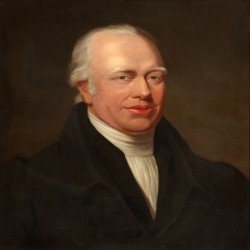
Adam Clarke
| Date of Birth | : | 26 Jun, 1762 |
| Date of Death | : | 26 Aug, 1832 |
| Place of Birth | : | Moybeg Kirley |
| Profession | : | Theologian |
| Nationality | : | British |
Adam Clarke was a British Methodist theologian who served three times as President of the Wesleyan Methodist Conference (1806–07, 1814–15 and 1822–23). A biblical scholar, he published an influential Bible commentary among other works. He was a Wesleyan.
Early life and Education
Clarke was born in 1760 or 1762, in the townland of Moybeg Kirley near Tobermore in County Londonderry. His father, an Anglican, was a village schoolmaster and farmer; his mother was a Presbyterian. His childhood consisted of a series of life-threatening mishaps. After receiving a very limited education he was apprenticed to a linen manufacturer, but, finding the employment uncongenial, he resumed school-life at the institution founded by Wesley at Kingswood.
In 1778, at the age of fourteen, Rev. John Wesley invited him to become a pupil in the Methodist seminary lately established at Kingswood, Bristol. In 1779, he converted to Methodism after listening to a preacher.
Career
In 1782, at nineteen he became an itinerant preacher, appointed to the circuit of Bradford, Wiltshire, until 1805. He afterwards resided chiefly in London, and devoted much of his time to literary research.
While second to none in the labours of the ministry, Clarke was a most assiduous scholar. First the classics engaged his especial attention, then the early Christian fathers, and then Oriental writers; Hebrew, Syriac, Arabic, Persian, Sanskrit, and other Eastern tongues, with the literature which they represented, being among the subjects of his study. Natural science was a favourite subject, and he had an interest in what are called the occult sciences. He contributed to the Eclectic Review from the date of its establishment in 1804, and rendered much literary assistance to the British and Foreign Bible Society.
In 1807 he received the diploma of M.A. from the university and King's College, Aberdeen. In 1808 the University of Aberdeen conferred on Clarke the honorary degree of LL.D., the university highest academic honour. In 1815, Clarke removed and resided in an estate in Millbrook, for several years. In 1823, Clarke removed to London and afterwards to Haydon Hall, where he resided until his death.
Death
Clarke died from an attack of cholera on 26 August 1832. There is a memorial to Adam Clarke in Portrush, Antrim, County Antrim.
Quotes
The Bible is proved to be a revelation from God, by the reasonableness and holiness of its precepts; all its commands, exhortations, and promises having the most direct tendency to make men wise, holy, and happy in themselves, and useful to one another.
Let it ever be remembered that genuine faith in Christ will ever be productive of good works; for this faith worketh by love, as the apostle says, and love to God always produces obedience to his holy laws.
I have lived to know that the secret of happiness is never to allow your energies to stagnate.
As preachers of the gospel of Jesus, do not expect worldly honors: these Jesus Christ neither took to himself, nor gave to his disciples.
Pride works frequently under a dense mask, and will often assume the garb of humility.
We communicate happiness to others not often by great acts of devotion and self-sacrifice, but by the absence of fault-finding and censure, by being ready to sympathize with their notions and feelings, instead of forcing them to sympathize with ours.
Deeply consider that it is your duty and interest to read the Holy Scriptures.
It is the grace of God, that shows and condemns the sin that humbles us.
There is no such thing as chance or accident; the words merely signify our ignorance of some real and immediate cause.
To suppose more than one supreme Source of infinite wisdom, power, and all perfections, is to assert that there is no supreme Being in existence.
